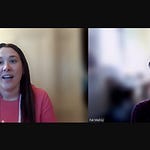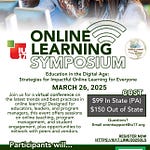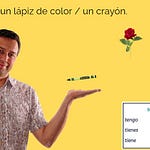Hi WOL Friends!
We hope this episode is allowing you some time to take a breath, stop and reflect, and enjoy some time on what matters most to you.
We are grateful to be able to continue building on the work we do in the virtual/online world. As we take advantage of the opportunities to connect at conferences we learn and grow. Our goal is to continuously improve the student experience and to keep learning at the center. We do our best to sift through relevant research and honor the feedback of our students and team to build courses that feel connected and allow for self-discovery, curiosity, rigor, and relevance.
Olivia highlights the value of reflection in this episode. As you listen in here are a few takeaways about why reflection is so essential for us as educators.
Takeaways from Olivia:
Olivia feels grateful to have been able to attend and present at three conferences this winter - the National Association of Rural Educators (School Leaders), ACTFL (World Language Educators), and Association of Educations Service Agencies - and she is heading to DLAC (Digital Learning Annual Conference) in February to present a Pechakuch about The Courses They Wouldn’t Have Taken.
She likes to plan for what to learn at a conference! She used to go looking for ideas. Now she looks to network, and build relationships with people who she respects or works with on committees. Building these relationships in person allows us to expand what we know from others we don’t see every day and get out of the box of our day-to-day thinking.
One of her most impactful learnings was at the NREA conference on rural education. She had her eyes opened to the vastness of what it can mean to be a rural school, and the creativity, as well as the abundance of ingenuity that goes into serving rural learners. Listen in - this is great!
At ACTFL Olivia met other members of the Diversity and Inclusion Committee, in person. She is grateful to join so many thoughtful professionals and to contribute to the organization and explore what DEI means in such a multicultural organization.
Effective action is followed by careful reflection. So, what would it mean if we took time as we move from one activity to another? See the pictures in this article of how the brain responds to ‘time’ between meetings, activities, etc. And remember a 5-year-old can think about thinking, you can too!
AESA provided some great snippets of insight from Brian Buffington, Olivia said he was the most visible person at the conference and was super inspirational. Find out more about him HERE.
Positive deviance! Cindy Martin, the Deputy Secretary of Education talked about how to shine a light on things that are different from the norm and make things better.
How are you making the table longer? Jose Andres - check out the podcast.
What are you reflecting on these days? Can you think of people in your organization shining the light? Have you excited to learn something new recently - were you able to use it?
Resources we use to reflect and learn:
Again, we get so much from Dr. Tom Butler’s Newsletter - Read and Subscribe HERE
The latest education research from Edutopia offers a ton of great insight. These two are particularly relevant to the WOL! Check them out.
In 2022, we learned that the kinds of breaks make a difference, too. One study compared in-classroom breaks like drawing or building puzzles with outdoor breaks like running or playing in sandboxes. In a nod to the power of movement—and free time—it was the kids playing outside who returned to class ready to learn, probably because indoor games, like indoor voices, required children to engage in more self-regulation, the researchers speculated. Meanwhile, an analysis examining “green breaks”—brief strolls in a park or visits to a school garden—concluded that students who partook in the activities performed better on tests of attention and working memory.
When teaching students foundational concepts, a video lesson equipped with a simple pause button, for example, may allow students to reset cognitively as they reach their attentional limits, a 2022 study concluded. Pause buttons, like rewind buttons, are also crucial for learners who encounter “complex learning materials,” have “low prior knowledge,” or exhibit “low working memory capacities.”
Increasingly, the intrinsic value of targeted video lessons is borne out in research. In a feature on Edutopia, we looked at research suggesting that video learning supported self-pacing and flexible, 24/7 access to lessons; that questions embedded in videos improved academic performance, increased note-taking, and reduced stress (see these 2015 and 2020 studies); and that video versions of lectures tended to “make content more coherent” to students.
We are here to help. Email pmulroy@worldoflearninginstitute. com for more information.















Share this post